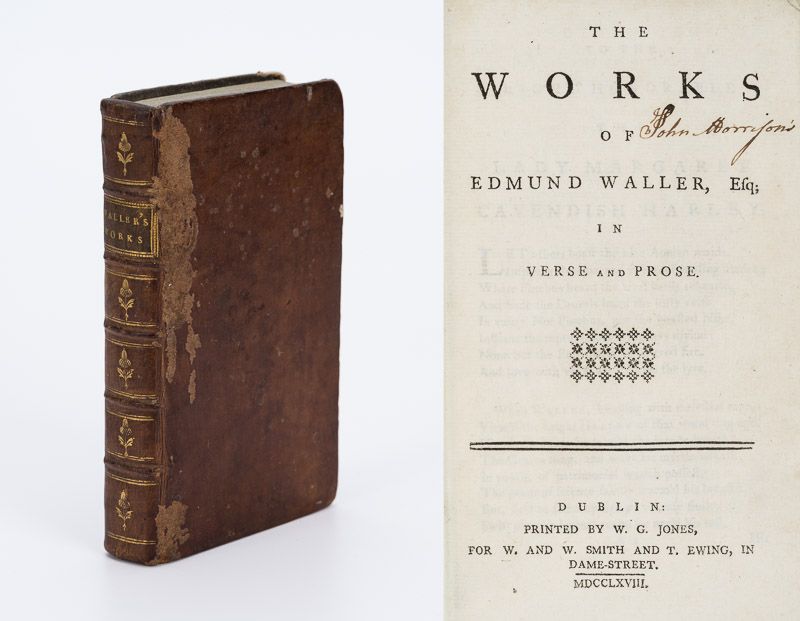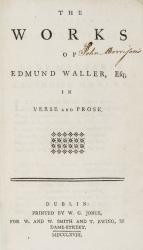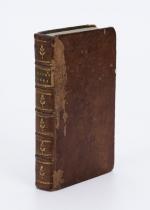Waller, The Works of Edmund Waller, Esq. in Verse and Prose.
The Works of Edmund Waller, Esq. in Verse and Prose.
First Dublin Edition. Dublin, Printed by W.G.Jones for W. and W.Smith and T.Ewing in Dame-Street, 1768. Small-Octavo. [8], LXIV, 272 pages. Hardcover / Original, 18th century full-leather with gilt lettering and ornament on spine. Binding very firm and only slightly bumped and rubbed. Overall in a very good condition with some signs of external wear. With the name “John Morrison” on the titlepage [possibly the 18th century – Architect John Morrison from Midleton, with a connection to Castlemartyr]. This book came subsequently from the Library of Daniel Conner, Connerville / Bandon / Manch House in which also a set of Buffon, from the library of Richard Boyle Bernard, Dean of Leighlin and MP for Bandon Bridge was included.
Includes for example:
Of the Danger His Majesty, being Prince, escaped on the road at St.Andero / Of his Majesty’s receiving the News of the Duke of Buckingham’s death / To the King on His Navy / On the taking of Salle / Upon his Majesty’s repairing of St.Paul’s / Of the Queen / The Apology of Sleep, for not approaching the Lady who can do anything but sleep when she pleaseth / To the Queen-Mother of France, upon her landing / The Country to my Lady of Carlisle / The Countess of Carlisle in Mourning / In answer to one who writ a Libel against the Countess of Carlisle / To my Lord of Northumberland upon the Death of his Lady / Of a Tree cut in Paper / Upon the Earl of Roscommon’s Translation of Horace de arte Poetica : and of the use of Poetry / Speeches in the House of Commons etc.
Edmund Waller, FRS (3 March 1606 – 21 October 1687) was an English poet and politician who was Member of Parliament for various constituencies between 1624 and 1687, and one of the longest serving members of the English House of Commons.
Son of a wealthy lawyer with extensive estates in Buckinghamshire, Waller first entered Parliament in 1624, although he played little part in the political struggles of the period prior to the First English Civil War in 1642. Unlike his relatives William and Hardress Waller, he was Royalist in sympathy and was accused in 1643 of organising a plot to seize London for Charles I. He allegedly escaped the death penalty by paying a large bribe, while several conspirators were executed, including his brother-in-law Nathaniel Tomkins.
After his sentence was commuted to banishment, he lived in comfortable exile in France and Switzerland until allowed home in 1651 by Oliver Cromwell, a distant relative. He returned to Parliament after The Restoration in 1660 of Charles II; known as a fine and amusing orator, he held a number of minor offices. He largely retired from active politics after the death of his second wife in 1677, and died of edema in October 1687.
Best remembered now for his poem “Song (Go, lovely rose)”, Waller’s earliest writing dates to the late 1630s, commemorating events that occurred in the 1620s, including a piece on Charles’s escape from a shipwreck at Santander in 1625. Written in heroic couplets, it is one of the first examples of a form used by English poets for some two centuries; his verse was admired by John Dryden among others, while he was a close friend of Thomas Hobbes and John Evelyn.
When he died, Waller was considered a major English poet, but his reputation declined over the next century, one view seeing him as a ‘fairweather Royalist, an expedient Republican and mercenary bridegroom’. He is now regarded as a minor author, whose primary significance was to develop a form adapted and improved by later poets like Alexander Pope.
Edmund Waller was born on 3 March 1606 at Stocks Place, Coleshill, Buckinghamshire, eldest son of Robert Waller (1560–1616) and Anne Hampden (1589–1658). He came from a family of 15, many of whom survived to adulthood, including Elizabeth (1601–?), Anne (1602–1642), Cecilia (1603–?), Robert (1606–1641), Mary (1608–1660), Ursula (1610–1692) and John (1616–1667). Cecilia married Nathaniel Tomkins, executed for his part in the 1643 plot, while Mary married Adrian Scrope, executed in 1660 as a regicide.
In addition, Waller was related to several prominent Parliamentarians; through his mother, he was distantly connected to Oliver Cromwell, while he and John Hampden were grandchildren of Griffith Hampden (1543–1591). On his father’s side, he was related to the Parliamentarian generals Sir Hardress and Sir William Waller.
In 1631, he married Anne Banks, orphaned heiress of a wealthy merchant; contracted in defiance of the Privy Council of England, the marriage was eventually approved by Charles I. Anne died in childbirth in 1634, leaving two children, Robert (1633–1652?) and Elizabeth (1634–1683).
In 1644, he re-married, this time to Mary Bracey (died 1677) and they had numerous children; since their eldest son Benjamin was mentally disabled, he was succeeded by Edmund (1652–1700), MP for Amersham from 1689 to 1698. His youngest son Stephen (1676–1708) was one of the Commissioners who negotiated the 1707 Treaty of Union. On his death, his estate was valued at the then considerable sum of £40,000; he left legacies to his children Margaret (1648–1690), who acted as his secretary and Benjamin’s guardian, Mary, Elizabeth, Anne, Cicely, Octavia, Dorothy and William. (Wikipedia)
- Keywords: 18th / 19th Century Country House Library of Daniel Conner – Manch House · 18th Century – Rare · Catalogue Ten – International Literature · English Literature – Rare · English Literature of the 17th century · John Morrison Library
- Language: English
- Inventory Number: 31405AB
EUR 220,--
© 2026 Inanna Rare Books Ltd. | Powered by HESCOM-Software












